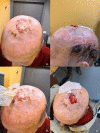Immunotherapy for the Treatment of Cutaneous Squamous Cell Carcinoma
- PMID: 34513710
- PMCID: PMC8427439
- DOI: 10.3389/fonc.2021.733917
Immunotherapy for the Treatment of Cutaneous Squamous Cell Carcinoma
Abstract
Cutaneous squamous cell carcinoma (CSCC) accounts for approximately 20% of all keratinocytic tumors. In most cases, the diagnosis and treatments are made on small, low-risk lesions. However, in about 5% of cases, CSCC may present as either locally advanced or metastatic (i.e. with locoregional lymph nodes metastases or distant localizations). Prior to the introduction of immunotherapy in clinical practice, the standard treatment of advanced CSCC was not clearly defined, and up to 60% of patients received no systemic therapy. Thanks to a strong pre-clinical rationale, clinical trials led to the FDA (Food and Drug Administration) and EMA (European Medicines Agency) registration of cemiplimab, a PD-1 inhibitor that achieved encouraging results in terms of objective response, overall survival, and quality of life. Subsequently, the anti-PD-1 pembrolizumab received the approval for the treatment of advanced CSCC by the FDA only. In this review, we will focus on the definition of advanced CSCC and on the current and future therapeutic options, with a particular regard for immunotherapy.
Keywords: CSCC; anti-PD-1 (programmed cell death-1 protein) monoclonal antibody; cemiplimab; cutaneous squamous cell carcinoma; immunotherapy; keratinocyte carcinomas; non-melanoma skin cancer; skin cancer.
Copyright © 2021 Boutros, Cecchi, Tanda, Croce, Gili, Arecco, Spagnolo and Queirolo.
Conflict of interest statement
FS received honoraria for presentations or lectures from Sanofi, Roche, BMS, Novartis, Merk, SunPharma, MSD, Pierre Fabre, and surved on advisory boards of Novartis, Philogen, SunPharma and MSD; PQ reports consulting or advisory role for Bristol Myers Squibb, Merck & Co., Novartis, Pierre Favre, Roche/Genentech, and Sanofi. The remaining authors declare that the research was conducted in the absence of any commercial or financial relationships that could be construed as a potential conflict of interest.
Figures


References
-
- Brewer JD, Shanafelt TD, Khezri F, Sosa Seda IM, Zubair AS, Baum CL, et al. . Increased Incidence and Recurrence Rates of Nonmelanoma Skin Cancer in Patients With Non-Hodgkin Lymphoma: A Rochester Epidemiology Project Population-Based Study in Minnesota. J Am Acad Dermatol (2015) 72(2):302–9. 10.1016/j.jaad.2014.10.028 - DOI - PMC - PubMed
Publication types
LinkOut - more resources
Full Text Sources
Research Materials

